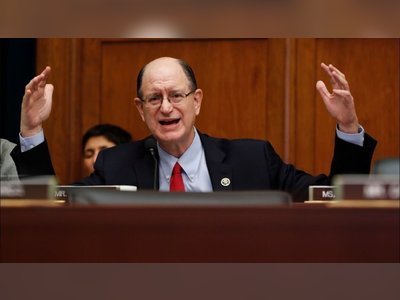
United States travel rules: Here's what you need to know
New rules around air, land and ferry travel into the US will replace a patchwork of restrictions and make vaccination the key to entry for nearly all foreign visitors.
Here's what travelers need to know about the new rules:
Who can travel?
The policies allow fully vaccinated noncitizen, nonimmigrant travelers to enter the United States, replacing a patchwork of bans that have been in place since the start of the pandemic.
The vaccination requirement goes into effect November 8 for both air travelers and those crossing borders via land and ferry.
The new system means foreign nationals arriving from countries that have been subject to bans -- China, Iran, Europe's Schengen area, the United Kingdom, the Republic of Ireland, Brazil, South Africa and India -- will soon be allowed to travel to the US.
The US Centers for Disease Control and Prevention has posted the air travel rules and a travel assessment to help people navigate the new system.
Which vaccines are accepted?
All FDA-approved and authorized vaccines, as well as vaccines that have an Emergency Use Listing from the WHO, will be accepted for entry into the United States.
That means the AstraZeneca vaccine, used in places including Canada and Europe, will be accepted. The Sputnik V vaccine developed in Russia is among several vaccines in use that have not been approved by the World Health Organization or the Food and Drug Administration.
People are considered "fully vaccinated" by the CDC two weeks after their second dose in a two-dose series, or two weeks after a single-dose vaccine.
Mixed-dose vaccinations will also be accepted. That means individuals are considered fully vaccinated two weeks after receipt of the last dose of "any combination of two doses of an FDA approved/authorized or WHO emergency use listed COVID-19 two-dose series," according to CDC guidance.
Some participants in vaccine trials will also be considered fully vaccinated.
What about unvaccinated Americans?
The presidential proclamation and CDC orders that establish the new air travel rules do not apply to US citizens, US nationals, US lawful permanent residents or immigrants.
But unvaccinated members of those groups will face more stringent testing requirements for air travel.
They will need to provide a negative viral test taken within one day of departure for the US.
A test 3 to 5 days after travel is recommended for all American travelers. Those who are unvaccinated should also self-quarantine for a full 7 days, even if the test is negative, the CDC advises.
The rules for Americans and legal permanent residents are different for travel via land and ferry crossings.
They do not need to show proof of vaccination to return to the US, according to CBP officials. Covid tests are not required to cross a land border.
What about unvaccinated children?
Foreign national children younger than 18 arriving by air are exempt from the vaccination requirement. They are subject to testing (see below).
Children under the age of 18 crossing via land or ferry will also be exempted from the vaccination requirement provided that they are traveling with a fully vaccinated adult, and testing is not required.
Are there other exceptions to the vaccination requirement?
There are a few other rare vaccination exceptions for international travelers, according to a White House fact sheet pertaining to air travel.
Those include "certain Covid-19 vaccine clinical trial participants, those with medical contraindications to the vaccines, those who need to travel for emergency or humanitarian reasons (with a US government-issued letter affirming the urgent need to travel), those who are traveling on non-tourist visas from countries with low-vaccine availability (as determined by the CDC), and other very narrow categories."
The list of countries with limited vaccine availability is posted on the CDC website and will be updated every three months.
However, travelers' reasons for entering the US from those countries must be compelling. "They need to have a specific, compelling reason. So, tourist visas will not qualify for that," a senior official said.
Is testing required?
Yes, testing will still be required for vaccinated air travelers and will become more stringent for unvaccinated air travelers.
Fully vaccinated air travelers, regardless of citizenship, are required to test negative for Covid-19 within three days of their flight's departure for the United States, in line with the current testing rule.
Unvaccinated US citizens, legal permanent residents and any unvaccinated foreign nationals exempt from the vaccination requirement will be required to take a Covid-19 test within one day of their departing flight.
Children younger than 2 do not need to test. Those from ages 2 to 17 are required to take a test before departure.
If traveling with fully vaccinated adults, unvaccinated children can test three days before departure. Unvaccinated children traveling alone or with unvaccinated adults will be required to test within one day of departure.
Foreign travelers who are not fully vaccinated and allowed to travel to the US under an exception to the vaccination rule are required to take a test 3 to 5 days after arrival and self-quarantine for a full 7 days, even if the test is negative.
Covid tests are not required to cross a land border.
What kind of documentation is required?
Both digital and paper proof of vaccination will be accepted as long as the documentation meets US requirements for being fully vaccinated, officials said.
According to the White House fact sheet, airlines will be responsible for determining that the record "was issued by an official source (e.g., public health agency, government agency) in the country where the vaccine was given."
Airlines will also be charged with reviewing the information presented to determine that it meets the CDC's definition of "fully vaccinated" (see above).
All inbound air travelers will be required to provide contact information to airlines, per a CDC contact tracing order. That information must be turned over by airlines to the CDC when it's needed to follow up with travelers to mitigate the spread of disease.
A Q&A on the CDC website addresses specific questions about documentation.
According to the CDC, all proof of vaccination must include personal identifiers -- minimally the passenger's full name and date of birth -- that match their passport. The name of the source issuing the record and the vaccine manufacturer and dates of vaccination are also required.
At land and ferry crossings, travelers will be required to attest to their vaccination status and reason for travel and present proof of vaccination to a CBP officer upon request, according to CBP offiicals, and vaccine cards do not need to be in English.
Who can no longer get into the United States?
The new international travel system largely bars unvaccinated foreign nationals from entering the United States.
Unvaccinated travelers coming from countries not affected by travel bans who currently are allowed to fly into the US (from Mexico and Canada, for example) will no longer be allowed entry as of November 8.
At land borders, the vaccination requirement going into effect on November 8 applies to nonessential travel such as tourism and visits with friends and family.
Individuals traveling for essential reasons, including truck drivers and students, will still be allowed across borders until early January, whether they're vaccinated or not.
In January 2022, documented non-citizens traveling across the land border for both essential and nonessential reasons will be required to be fully vaccinated.











